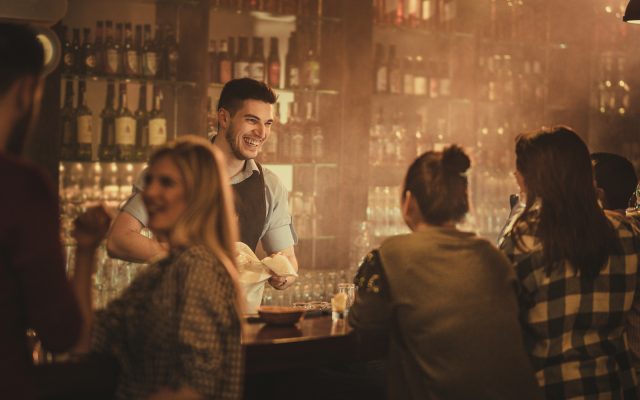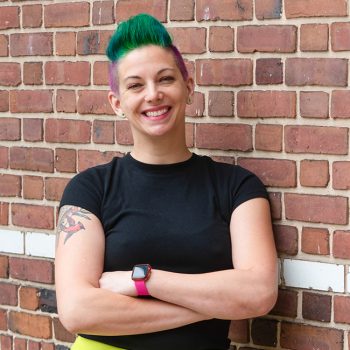How can bartenders stay safe and healthy?
By Lauren BowesWhen it comes to the myriad challenges facing on-trade staff, safety and health rarely come into the conversation. Amie Ward, the executive director of Safe Bars and founder of The Healthtender, is hoping to change that.

Safe Bars is a US non-profit that trains on-trade venues to recognise and intervene in problematic behaviours, focusing on bystander intervention and de-escalation.
Ward explains: “It is a programme designed to teach the staff of alcohol-serving establishments how to recognise problematic behaviours that are happening in their spaces, and then empowers them with the skills and tools to be able to intervene safely.
“This helps to counteract a lot of the problems that we see in the hospitality industry, where people are using alcohol as a weapon, or for camouflaging poor behaviour or for trying to incapacitate somebody.”
Safe Bars’ trainers teach about the psychology of the stress response and how bar staff can ground themselves in the moment, establish rapport and help to resolve the situation.

While there’s no replacement for Safe Bars’ in-depth training, Ward has a few quick tips for bartenders: “When you see something, do something. As a society, we’ve been taught to mind our own business and let people handle things on their own – but as the people who create experiences for guests, we need to create a safe environment for them as well.”
If you witness problematic behaviour or unwanted touching, for instance, Ward suggests asking a simple question. “It’s something so directly and inherently tied to hospitality – it could be: ‘Hey, how is everything going? How’s your night going? How’s that drink?’
“Things like this are in our vocabulary; we say them every time we’re on the bar. They’re intervention skills – it’s establishing that rapport, letting people know you’re here and doing something about it.”
She also adds that it’s OK to not want to intervene yourself, if you can tag in a co-worker, a manager or a regular you trust.
“We have let those behaviours go on for so long – but it doesn’t have to be that way. A precedent was set a long time ago, and I don’t know why we’re such a highly unregulated industry in this capacity, but it doesn’t have to be this way. We deserve respect and dignity, and our guests deserve that respect and a welcoming, safe, hospitable environment as well.
“When you see something, do something – don’t ignore it. Don’t think it’ll resolve itself, and don’t think you’re butting into something you shouldn’t, because trusting your gut and checking in is better than not doing anything at all.”
Protecting your own
But it’s not just guests who need protection from other guests. “Harassment happens in every direction – it is guest to guests, guests to staff, staff to staff, staff to guests,” adds Ward.
Her top tip is providing training to staff, and empowering them to intervene in unpleasant situations and ask for help if they need it. “It’s about letting them know that you will back them up in their decisions.”
She also recommends setting a code of conduct for both staff and guests. “You set the tone for the environment you’re creating. Say what you will allow, say what isn’t allowed. Make it explicit – put it on your website. Put the house rules in a cute little frame and have it in the bathrooms – put it everywhere so people know how they’re expected to behave once they step into this space.”
She also advises giving staff space and time to process if they have intervened in a situation with an escalated guest. “There’s a lot of adrenaline involved in that, as well as a dopamine drop. It can be a very emotional experience. And don’t just assume what your staff need – ask them. Ask them what would help them feel good in the moment – what would help them feel supported?
“We need to do anything we can do to centre our staff so we can support them in a better, more tangible way.”
The Healthtender
When it comes to health in the industry, most discussions revolve around mental health – when they happen, which is infrequently. But Ward’s other venture, The Healthtender, has a more physical focus.
“After bartending for so long, I could see the way my peers were drinking and not eating, while I’ve always been playing sports and trying to take care of myself the best way I can. I realised there was a gap between things that were everyday nature to me and what my peers had access and resources to,” she explains.
Ward studied to become an exercise physiologist and has certifications in mobility and health coaching. “I found a way to merge those two worlds and close that gap. I can provide the industry with really easy fixes for eating, drinking, doing better for themselves and treating their bodies like an athlete – because they really are. People in the hospitality industry are athletes – they work marathon shifts.”
Her tips range from ways to hold your body better and doing the right stretches to providing nutrition on the run and wearing the right shoes.
She adds that bar design doesn’t usually factor in ergonomics for its users. “Everything is designed to tank us – to hurt our bodies in every way. There are some cockpits and designs where we can step into the bar and everything’s on the sides, so we don’t have to work with everything in front of us – but it’s expensive. Access is a huge issue.”
She teaches bartenders to consider their stance, setting their feet in different places and seeing how they can reach for bottles while engaging their core and securing their lower back.
Other tips for staying healthy include making sure water is always within arm’s reach, as well as snacks or protein shakes to ensure a constant source of energy.
Ward’s aim is to make bartending a sustainable career choice in the long term. “We teach people to work within the resources and confines they have, so they can do their best and stay in this sector for as long as possible – not everybody gets to be a brand ambassador. We’re trying to set the right expectations and make sure that people can do this work for as long as possible.”
Related news
Bumbu sales soar in UK on-trade
